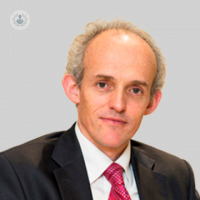Ageing and back pain: how to keep your spine healthy
Written by:Physical signs of ageing are a concern for us all, especially when it causes us pain. As we get older, back pain can become more apparent as well as bad posture. Whilst symptoms can intensify in our later years, there are a few preventative measures that can be taken.
We spoke with leading orthopaedic surgeon, Mr Caspar Aylott, who is an expert in back health, to find out what happens to our spine when we age. He kindly shared with us some tips on how we can keep our spines healthy and some of the conditions to look out for as we get older.

What happens to the discs between the vertebrae as we get older?
The intervertebral discs are the cushions or shock absorbers between the bones of the spine. As children and young adults, our discs contain a lot of water. As we age, disc nutrition becomes impaired, waste products build up within the disc and less water is contained within the disc.
Consequently the disc loses thickness and is less able to withstand the mechanical loads going through the spine. This is a normal ageing process but can lead to common problems such as back pain and ‘slipped discs’ with sciatica.
Interesting fact: water is also squeezed out of the discs over the course of a day when we are upright and goes back into the discs at night when lying down. This is why we are taller first thing in the morning when we get up than at the end of the day.
What conditions can arise as we age?
- Back pain - often first starts in young adults between 20-40 years old with episodes increasing in frequency to about age 65. About 85% of us will suffer from back pain at some stage in our lives. The spine has a tendency to stiffen after about 65 years with decreasing back pain.
- 'Slipped disc' - disc herniation, disc protrusion etc. all mean the same thing. Most common in young adults, this involves the central part of the disc escaping through a weakness or tear in the wall of the disc. This can cause back pain and if a nerve is also pinched pain down the leg with pins and needles and numbness referred to as sciatica can present.
- Facet joint pain - the small joints behind the spine will inevitably develop ‘wear and tear’ changes (osteoarthritis) to some extent as we age. This is a common cause of back pain.
- Spinal stenosis - this is narrowing of the bony canal or holes through which the nerves run. Often caused in older age by a combination of factors such as narrowing of the disc, enlargement of arthritic facet joints, bony spurs, etc.
What are the most common age-related back problems?
- Back or neck pain arising from ‘wear and tear’ (osteoarthritis) in discs and facet joints.
- Arm or leg pain caused by pinched nerves in the neck or lower back.
- Spinal stenosis - older patients generally with leg symptoms brought on by standing and walking.
How can you keep your spine healthy as you age?
The rate at which our spines age is mostly predicted by our genetics, i.e. our parents. Lifestyle and other medical conditions such as diabetes contribute to a much lesser degree. Long-term smoking is detrimental to our discs and just about everything else!
We can’t change our genetics but there are things which we can do to help our backs and reduce the impact of these degenerative changes. These include:
- Regular exercise, particularly brisk walking.
- Avoid sitting for longer than 30 minutes. Get up and move frequently.
- Healthy diet and maintaining hydration (drink water) throughout the day.
- Exercises to strengthen the core muscles of the back and tummy which become increasingly important for our spine as we age.
- Avoid very heavy lifting or repetitive lifting jobs.
- Don’t smoke
If you find that despite your efforts to keep your back healthy you’re experiencing mild to excruciating pain, then please do not hesitate to book an appointment with Mr Caspar Aylott via his Top Doctors profile.


